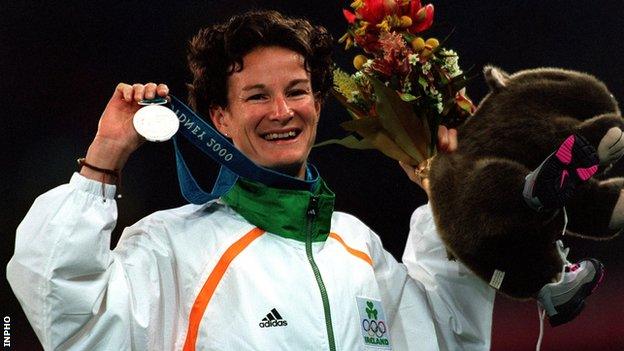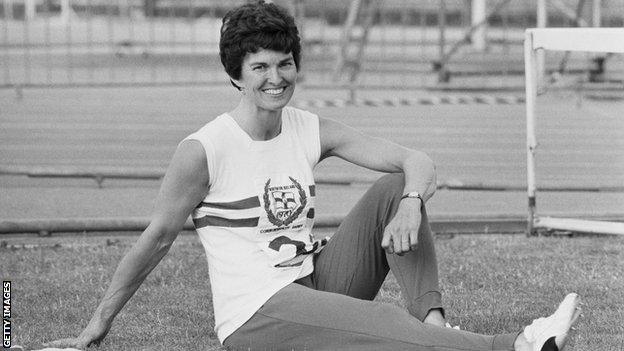Sonia O'Sullivan: Irish great thrilled at changed landscape of women's sport
- Published

O'Sullivan was silver medallist at the 2000 Olympics in Sydney - five years after winning 5,000m World Championship gold
"Athletics was just what I did because it was one of the few sports that women were able to do and available to us at that time."
On this International Women's Day, Sonia O'Sullivan's mind drifts back to her 1980s childhood in the county Cork town of Cobh.
She fondly remembers growing up in a sports mad household with her father John a former goalkeeper for the Cobh Ramblers club where Roy Keane later began his senior football career.
But there's no getting away from it that sporting options were limited for girls and women in those days in provincial Ireland.
The country had moved on somewhat from the 1950s when Ireland's first female track and field Olympian, the great Maeve Kyle, had read a letter in the Irish Times expressing outrage that she, an Irish mother, would be leaving her husband and daughter to travel to compete at the Melbourne Games.
But the explosion in women's sport which now has huge numbers of Irish females playing team sports such as gaelic games, football, rugby, cricket and hockey was some way off.
O'Sullivan's innately positive outlook on life means there is no sense of "having missed out on other opportunities", but she is nevertheless thrilled at the changed sporting horizons for Irish women.
"It's great now for female athletes to have so many different sports and choices available to them and so many Irish girls in particular taking part in the Olympics across a whole load of different sports," the Irish athletics great told BBC Radio Ulster's Sportsound Extra Time.
"You just see the different options and things they can aspire to be from an early age."

Maeve Kyle's selection as Ireland's first female track and field Olympian in 1956 led to complaints in the letters page of the Irish Times
As Sonia zeroed in on running, Zola Budd, Liz McColgan and Yvonne Murray were among her early heroes and by 1990 O'Sullivan was competing against the latter in the 3,000m final as the gutsy Scot won European Championship gold in Split.
"I remember watching their races and thinking 'I'd love to be like them one day'."
Two years after those European Championships in Croatia, O'Sullivan competed at her first Olympics in Barcelona as she was pipped for the bronze medal by Canada's Angela Chalmers in the 3,000m - a fourth place which brought back unwanted Irish memories of Eamonn Coghlan's Games near misses.
But by 1994 O'Sullivan was winning European 3,000m Championship gold in Helsinki as she finished ahead of Murray, which started a run of triumphs highlighted by her Olympic 5,000m silver medal in Sydney six years later.
Not that there weren't setbacks along the way. After having won the world 5,000m title in Gothenburg in 1995, O'Sullivan went into the Atlanta Olympics as a gold medal favourite only for illness to completely derail her challenge and many thought her career was effectively over a year later after chastening performances in the 1500m and 5,000m at the World Championships in Athens.
But from the ashes of Athens, O'Sullivan rose to have an astonishing 1998 season which included double gold at the World Cross Country Championships in Marrakesh and two more European track titles in Budapest.
'You stay in your own lane'
Looking back, O'Sullivan believes her greatest attribute was the ability "to keep things as simple as possible" and not be distracted by the noise that was around her as a world-class athlete - even though social media had not yet arrived.
"You stay in your own lane," she said. "You do what you are trying to do and not worrying about what others are doing or what others are saying.
"If things are going really well for you, it's really easy to block out things. But when things are not going so well, it's easy to kind of look around and have things come into your life that you normally don't let come in. Then they become more of a factor than they should be."
As regards her own Olympic memories, O'Sullivan is typically succinct as she recalls her four Games, which began in Barcelona and ended with her effectively doing a lap of honour on the concluding 400 metres of the 5,000m final in Athens amid huge applause from a packed stadium after she was last of the 14 finishers behind winner Meseret Defar.
"1992 was fantastic, I really enjoyed it," O'Sullivan said. "1996 was a bit more tricky because I was fighting a battle with myself and I knew I wasn't right so I couldn't relax.
"Sydney was good fun as well. We did a lot of stuff outside of just getting ready for the race when my older daughter Ciara was with us, so that was a nice distraction. We had to keep her entertained as well. Athens was OK but it was a bit odd there. It just wasn't the same kind of thing.
"A lot of the Olympics is the build-up to it and the qualification. That can be the most fun and exciting times - just achieving the qualification to go to the Olympics. It means so much to your friends and all your family.
"Sometimes the Olympics are great for athletes and sometimes it's disappointing but when all athletes look back and reflect on their time at the Olympics, they all appreciate it as being one of the great times in their lives."